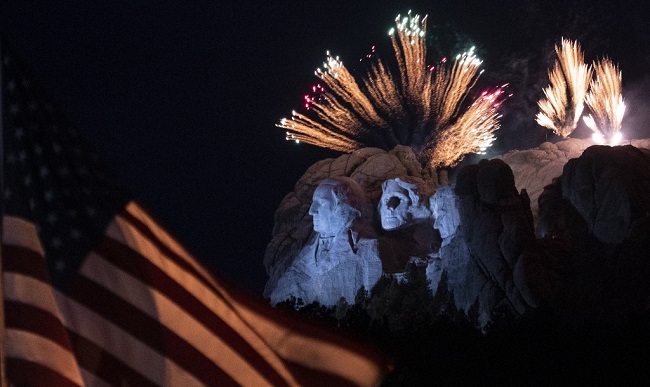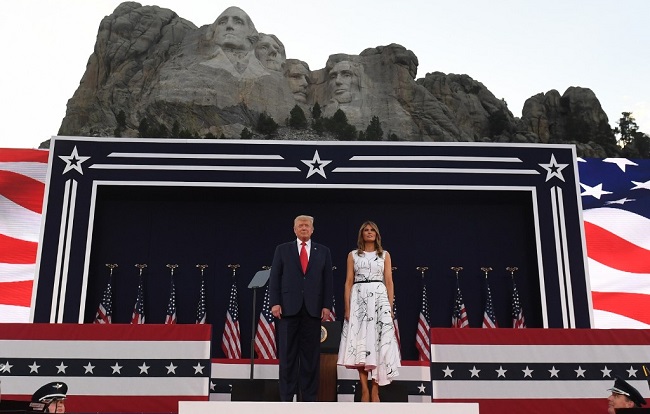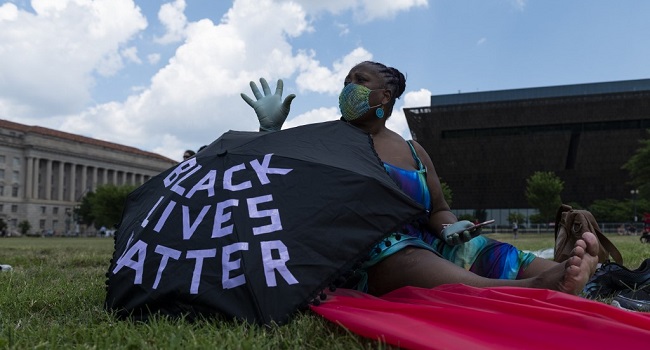The United States marked its Independence Day on Saturday in a somber mood, as a record surge in coronavirus cases, anti-racism protests and an angry speech from President Donald Trump have cast a shadow over what normally are festive celebrations.
Popular beaches on both coasts — normally packed on July 4th — were closed as California and Florida suffer alarming surges in COVID-19 infections.
“You should assume everyone around you is infectious,” Los Angeles Mayor Eric Garcetti warned.
Across the country, Main Street parades have been canceled, backyard barbecues scaled down, and family reunions put off amid worries about spreading the virus on a day when Americans typically celebrate their 1776 declaration of independence from Britain.
Florida said Saturday it had marked a new daily high in confirmed virus cases at 11,458 — far more than any other state — and Miami Beach imposed a curfew and made mask-wearing mandatory in public. Yet some Florida beaches remained open.
The US virus death toll is fast approaching 130,000, roughly one-quarter the world’s total.

Fireworks canceled
Fireworks displays are typically a high point of the holiday, but an estimated 80 percent of the events, including in cities like Indianapolis, Atlanta and Nashville, have been canceled this year.
Some locales are urging people to watch fireworks from their cars.
But other Americans, weary of lockdowns or simply defiant, carry on as if the deadly pandemic were a thing of the past.
Continuing a year of confusingly mixed signals, local officials in Washington have discouraged residents from massing on the National Mall for the capital’s fireworks display.

Trump, fresh from his appearance Friday before the monumental sculpture of four presidents on Mount Rushmore, plans to take in Saturday’s “Salute to America” in Washington, complete with military music and flyovers, from a White House balcony.
He and his wife, Melania, released a video message wishing Americans “a very, very happy Fourth of July.”
Trump was optimistic on virus trends that have health officials deeply concerned. “We got hit with this terrible plague from China,” he said, “and now we are getting close to fighting our way out of it.”
Trump’s address at the Washington festivities will pay tribute to health care workers, police and the military, White House spokesman Judd Deere told AFP.
Social distancing would be observed, he added — in contrast to the practice at Mount Rushmore.
‘Violent mayhem’
While presidents’ July 4th speeches traditionally are uplifting affairs that emphasize patriotism and national unity, Trump in South Dakota angrily lashed out at protests that have erupted since unarmed African American George Floyd was killed by police.
Facing a tough re-election battle in November and eager to mobilize his political base, Trump denounced “violent mayhem” on US streets, though most demonstrations have been peaceful, and accused protesters of waging “a merciless campaign to wipe out our history, defame our heroes, erase our values, and indoctrinate our children.”
Trump’s presumptive opponent in the fall, Democrat Joe Biden, struck a sharply different tone, tweeting Saturday: “Our nation was founded on a simple idea: We’re all created equal. We’ve never lived up to it — but we’ve never stopped trying. This Independence Day, let’s not just celebrate those words, let’s commit to finally fulfill them.”

Protests have continued in many US cities since Floyd’s killing in May, and more than a score of demonstrations were taking place Saturday in Washington, including a George Floyd Memorial March and a Black Lives Matter protest.
All the demonstrations, in theory, should be over before the night’s celebration on the Mall, set to start at 6:40pm (22H40 GMT).
Health officials have been bracing for a new spike in virus cases after this weekend.
Some link the latest flareup to the delayed result of widespread celebrations during the Memorial Day holiday in late May, and to the reopening of some states’ economies starting around that time.
And they see this weekend as a potential tipping point — in the worst case, a replay of the post-Memorial Day resurgence.
-AFP

















